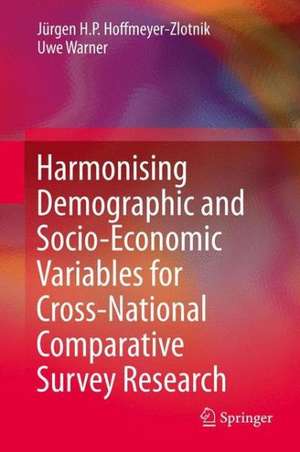Harmonising Demographic and Socio-Economic Variables for Cross-National Comparative Survey Research
Autor Jürgen H.P. Hoffmeyer-Zlotnik, Uwe Warneren Limba Engleză Hardback – 22 oct 2013
| Toate formatele și edițiile | Preț | Express |
|---|---|---|
| Paperback (1) | 640.24 lei 6-8 săpt. | |
| SPRINGER NETHERLANDS – 23 aug 2016 | 640.24 lei 6-8 săpt. | |
| Hardback (1) | 646.43 lei 6-8 săpt. | |
| SPRINGER NETHERLANDS – 22 oct 2013 | 646.43 lei 6-8 săpt. |
Preț: 646.43 lei
Preț vechi: 760.50 lei
-15% Nou
Puncte Express: 970
Preț estimativ în valută:
123.71€ • 128.42$ • 103.15£
123.71€ • 128.42$ • 103.15£
Carte tipărită la comandă
Livrare economică 25 martie-08 aprilie
Preluare comenzi: 021 569.72.76
Specificații
ISBN-13: 9789400772373
ISBN-10: 9400772378
Pagini: 292
Ilustrații: XVI, 274 p. 17 illus., 5 illus. in color.
Dimensiuni: 155 x 235 x 21 mm
Greutate: 0.59 kg
Ediția:2014
Editura: SPRINGER NETHERLANDS
Colecția Springer
Locul publicării:Dordrecht, Netherlands
ISBN-10: 9400772378
Pagini: 292
Ilustrații: XVI, 274 p. 17 illus., 5 illus. in color.
Dimensiuni: 155 x 235 x 21 mm
Greutate: 0.59 kg
Ediția:2014
Editura: SPRINGER NETHERLANDS
Colecția Springer
Locul publicării:Dordrecht, Netherlands
Public țintă
ResearchCuprins
Chapter 1. Harmonisation of Demographic and Socio-Economic Variables.- Chapter 2. The Harmonisation Process: Harmonosation is not Translation.- Chapter 3. Existing Measurement Instruments for Data Collection.- Chapter 4. Background Variables for Cross-National Comparative Research: Data Sources.- Chapter 5. Core Social Variables and Their Implentation in Measurement Instruments.- Chapter 6. The Proposed Set of Instruments at a Glance.- Chapter 7. Comparability of Currently Available Survey Data.
Recenzii
“The monograph is devoted to the problem of cross-national comparative measurement in survey studies. … The book is interesting, innovative, and can serve to all those who are engaged in cross-national studies facilitating achievement of the comparative measurement in survey research.” (Stan Lipovetsky, Technometrics, Vol. 58 (2), 2016)
Notă biografică
Prof. Dr. Jürgen H.P. Hoffmeyer-Zlotnik is head of Knowledge Transfer Unit of GESIS – Leibniz Institute for the Social Sciences in Mannheim, Germany. He is coordinating coordinate and organize the GESIS workshop and seminar program and organize the GESIS Summer School on Survey Methodology, starting in 2012. His main research interests are standardization and harmonization of demographic and socio-economic background variables for national and international comparison and cross-country comparative survey research. Dr. Uwe Warner is conseiller scientifique at the "Centre d'Etudes de Population, de Pauvreté et de Politiques Socio-Economiques / International Network for Studies in Technology, Environment, Alternatives, Development (CEPS/INSTEAD)" in Luxembourg. He is the national coordinator of ESS in Luxembourg; he was responsible for the Luxembourgian data collection and data integration into ECHP; he is in charge of carrying out various national surveys in Luxembourg. His main researchinterests are standardization and harmonization of demographic and socio-economic background variables for international comparison, cross-country comparative survey research, and international studies on income distribution, poverty and social welfare.
Textul de pe ultima copertă
This book explains harmonisation techniques that can be used in survey research to align national systems of categories and definitions in such a way that comparison is possible across countries and cultures. It provides an introduction to instruments for collecting internationally comparable data of interest to survey researchers. It shows how seven key demographic and socio-economic variables can be harmonised and employed in European comparative surveys. The seven key variables discussed in detail are: education, occupation, income, activity status, private household, ethnicity, and family. These demographic and socio-economic variables are background variables that no survey can do without. They frequently have the greatest explanatory capacity to analyse social structures, and are a mirror image of the way societies are organised nationally. This becomes readily apparent when one attempts, for example, to compare national education systems. Moreover, a comparison of the national definitions of concepts such as "private household" reveals several different historically and culturally shaped underlying concepts. Indeed, some European countries do not even have a word for "private household". Hence such national definitions and categories cannot simply be translated from one culture to another. They must be harmonised.
Caracteristici
Provides harmonisation techniques for researchers engaged in cross-national comparative social science research in Europe Discusses individual techniques of harmonisation using international comparison Explains harmonisation techniques that can be used in survey research to align national systems of categories and definitions











